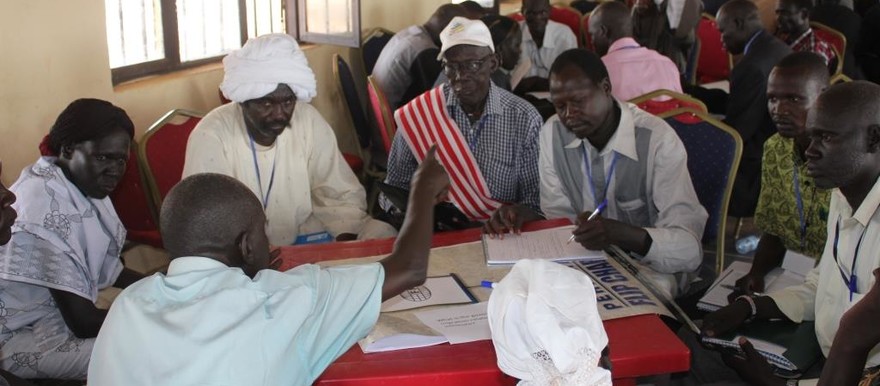Border tribes at a migration conference in Unity State have passed resolutions on key security and justice issues. The event involved participants from the Misseriya and Fallata tribes of Sudan together with the Nuer and Dinka tribes of South Sudan.
The resolutions allocate responsibilities related to maintaining peace and co-existence among the tribes during both times of migration and other seasons. Draft resolutions seen by Radio Tamazuj consisted of four sections: responsibilities of the traditional authorities, responsibilities of the county authorities, responsibilities of the state government, responsibilities of the NGOS and civil society.
Among the resolutions is one to form joint courts between nomadic and the host communities, which will comprise members from different tribes. Such courts are tasked with dealing with cases involving cattle raiding and murder.
After long debate, the participants also voted in favor of a resolution setting the compensation level for murder. The tribes voted by a majority vote of 29 in favour that intentional killing should be compensated with 75 cows and unintentional killing with 50 cows. Questions of definitions and enforcement, however, went unresolved.
According to the draft resolution, there were also agreements on a migration timetable, migration routes, grazing areas and water access points. They have also agreed on the formation of joint peace committee that is tasked with the responsibility of handling any conflict that crosses tribal lines.
Participants have also discussed establishing a system of regulating the sale of cattle in order to prevent people buying raided cattle. “Anybody from South Sudan crossing the border is first to obtain permission from the chief if he wants to sell off his cows – then the permission is sent to the county authority for further endorsement. This will help us keep the stolen ones until they are got,” said the paramount chief of Abiemnhom Simon Makuack Koang. He added that without controls it makes it easy for raiders to sell cattle and makes recovery of raided cattle difficult.
The Misseriya participants have demanded the state to enforce these recommendations with a clear hand in order to develop trust among the border tribes. For their part, the Fallata of Pariang accused the commissioner of Pariang of not being serious: “When our cows are raided, they do not give them back to us even when we are seeing them,” said one of the elders.
He further said that they have had such conferences with the Dinka Pariang 17 times but all failed: “The security committee we formed turned on us and have been come a really problem to us – we need peace but the commissioner of Pariang does not like peace,” said a participant who requested anonymity.
Another elder, Chief of Fallata Adam Buram said that they will this time give the government a chance to enforce peace and the resolutions. “I am ready to deal with all the Fallata (under me) and they are ready to respond to me, but the question here is that whether the commissioner of Pariang is able and ready to do the same,” he said.
Deputy Governor Michael Chiangiok Geay, addressing the conference, reassured the tribal leaders of the state’s support and enforcement of the recommendations. He said they would be presented in the state parliament.
The deputy governor who is also the minister of local government also accused the peoples of Rubkona and Pariang of bad relations with the nomads and warned them to refrain from negative relations. “Our brother the Fallata and Misseriya may one day in future be part of us,” he added.
The conference was organized by the government and Concordis International with the support from the US Agency for International Development.




